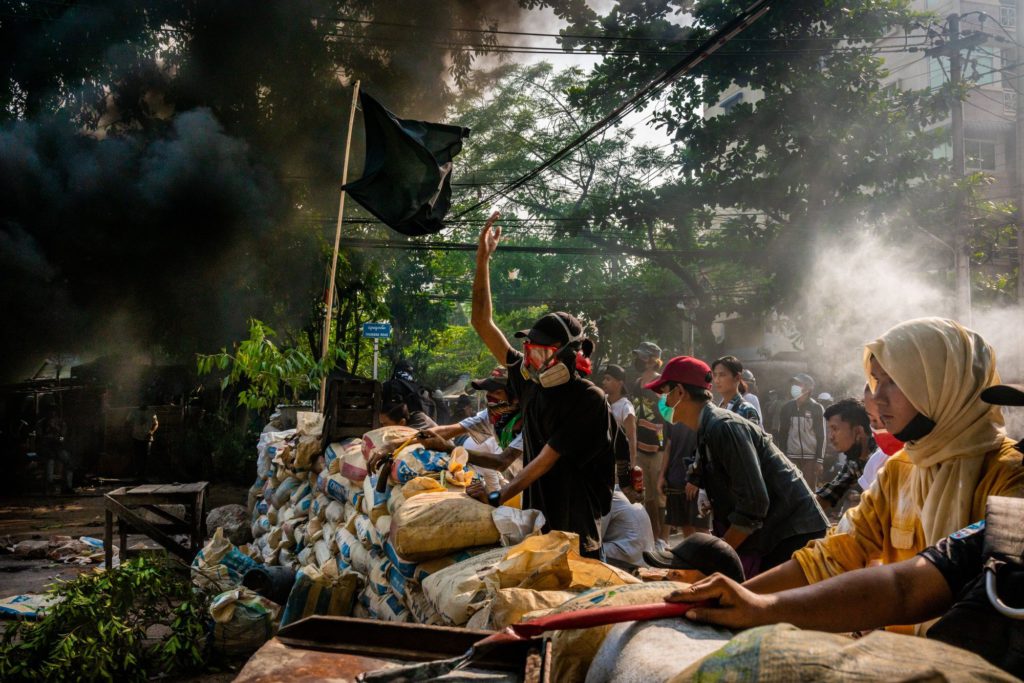The US and its allies Canada, the UK and Australia have imposed fresh sanctions on Myanmar, adding to pressure on the military regime, two years since it overthrew the civilian government led by Aung San Suu Kyi in a coup.
(Bloomberg) — The US and its allies Canada, the UK and Australia have imposed fresh sanctions on Myanmar, adding to pressure on the military regime, two years since it overthrew the civilian government led by Aung San Suu Kyi in a coup.
US Secretary of State Antony Blinken said in a statement Tuesday the US restrictions target six individuals and three entities linked to the junta’s efforts to generate revenue and procure arms, including senior leadership in its energy sector and its Air Force.
The sanctions were also leveled against an arms dealer and the Union Electoral Commission at a time the junta is seeking to advance plans to hold what Blinken said would be “deeply flawed elections.”
“The United States remains firm in our position that the regime’s planned elections cannot be free or fair, not while the regime has killed, detained, or forced possible contenders to flee, nor while it continues to inflict brutal violence against its peaceful opponents,” Blinken said.
The action from the US and its allies came ahead of a decision by the junta to extend a state of emergency that’s been in place since the coup by another six months. The move signals that elections, expected to be held by August, will now likely be delayed.
Myanmar’s military has used increasingly brutal tactics to subdue its enemies in recent months — even as it further entrenches Myanmar as a pariah state abroad. A rare United Nations Security Council resolution in December called for an end to violence and the release of all political prisoners. More than 2,900 people have been killed and thousands more arrested in the military crackdown that followed the takeover.
The regime has also struggled to stabilize an economy that contracted 18% last year and is now seeing soaring inflation, a weakening currency and shrinking foreign-currency reserves. Western sanctions targeting the coup leaders and related business entities, as well as an investor exodus, have harmed the junta’s finances. But while it presides over an economy in disarray, it retains control of vast economic interests, including lucrative natural gas exports.
The junta has found some support for its claim to rule from a handful of countries, while the grouping of regional nations charged with finding a diplomatic solution to the crisis remains divided, Thomas Andrews, UN special rapporteur on the situation of human rights in Myanmar, said in a report published Tuesday.
“These actions include presenting diplomatic credentials to SAC leadership, strengthening economic and military relations with the SAC, and — in the case of at least Belarus and India — publicly engaging with the SAC on its plans to hold sham elections,” he said of countries that also include China, Russia, Saudi Arabia, and Sri Lanka.
‘Far More’ Needed
While the US on Tuesday targeted leadership of the military-controlled Myanma Oil and Gas Enterprise, known as MOGE, it stopped short of penalizing the entity itself, drawing criticism from activists who have been pushing Washington to restrict one of the junta’s most important sources of revenue.
“While these latest sanctions are a positive step in cutting the junta’s access to resources, far more needs to be done to coordinate sanctions that systematically target the junta’s sources of revenue, arms and jet fuel,” said Justice for Myanmar spokesperson Yadanar Maung. “So far, only the EU has sanctioned MOGE.”
Canada announced restrictions against six individuals and a new prohibition on the export, sale, supply or shipment of aviation fuel to the Myanmar military regime, while the UK targeted “enablers of air force bombing campaign and repression of the civilian population.”
Australia, a longtime holdout on sanctions against Myanmar, imposed targeted financial restrictions and travel bans on individuals responsible for human rights abuses, the government said in a statement.
“My judgment is that the time has come for sanctions,” Foreign Minister Penny Wong said. “After careful deliberation and consultations Australia is imposing additional autonomous sanctions on those directly responsible for the military coup and ongoing repression and violence.”
(Updates with state of emergency extension in paragraph five.)
More stories like this are available on bloomberg.com
©2023 Bloomberg L.P.










